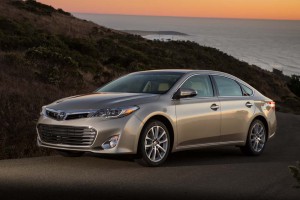(This story has been updated to reflect comments and details provided by Toyota.)
For the second time in recent years, Toyota has taken the unusual step of halting sales of almost its entire U.S. line-up due to a potential safety defect – however the maker says it currently does not plan to recall vehicles it has already sold.
That could change, however, if federal regulators decide a recall is warranted, a move now under study by the National Highway Traffic Safety Administration. It remains to be seen how the public will view the latest problem which occurs almost exactly four years after the Japanese giant briefly halted sales of a variety of vehicles due to potential problems with so-called unintended acceleration.
Today’s announcement covers such high-volume models as the Toyota Camry and Corolla sedans, as well as the Sienna minivan, and Tacoma and Tundra pickups. Also impacted are the full-size Avalon sedan and Avalon and Camry Hybrids. Only vehicles equipped with electric seat heaters are covered by the stop-sale announcement because they were manufactured with materials that did not meet flame-retardant standards.
“Toyota is preparing a modification for this condition, which will be implemented on all covered vehicles in dealer inventory. There have been no reports globally of any related incidents in the field with units in operation,” the automaker said in a statement.
A senior Toyota spokesman stressed that the maker does not consider the problem to pose a fire risk. Mike Michels telling TheDetroitBureau.com, “The fabric in the seats is flame retardant, it is a matter of HOW flame retardant when tested.”
Calling the decision “prudent,” Kelley Blue Book analyst Karl Brauer said it was nonetheless particularly ill-timed. “Given that much of the U.S. is currently in the grips of a record cold snap there’s sure to be high demand for models with seat heaters.”
(Auto insurance rates swing more wildly than gas prices, study reveals. Click Here for the inside story.)
The Toyota Camry was the best-selling passenger car in the U.S. last year, with total volume of 408,000 sedans. The Corolla was also on the Top 10 list with sales of more than 300,000. According to Kelley Blue Book, only a small percentage of those vehicles have been sold with seat heaters during the first part of the 2014 model-year, but all of the new Avalon sedans are equipped with the feature, as are 46% of Sienna minivans and 39% of Tundra CrewMax versions.
The affected models are all produced in the U.S., though the problem was flagged by regulators in South Korea who tested a seat on an American-made Camry Hybrid. Toyota recently began shipping that model from the States to Korea.
The announcement could prove a setback for Toyota which had been hoping to overcome any remaining stigma caused by its problems with unintended acceleration in 2009 and 2010. Those were the result of several issues including sticky accelerator pedals and loose floor mats that could jam accelerators. The maker ultimately recalled more than 10 million vehicles worldwide. It has also spent several billion dollars in settlements with impacted owners and on legal fees. But Toyota also was vindicated in some trials – and in a series of federal investigations – that have found no mysterious gremlins involving its electronic engine control technology.
(Tesla exec testy about possible recall. Click Here for more.)
Last year, Toyota’s top U.S. executive, Jim Lentz, declared the company past its safety-related woes but some analysts have questioned whether he spoke too soon. While final numbers haven’t yet been calculated by the NHTSA, Toyota was expected to once again have one of the highest totals in terms of the number of vehicles recalled in the U.S. of any major manufacturer. It took that dubious title during four of the previous five years.
The company also faced a series of record fines for failing to act on several safety recalls in a timely manner, as prescribed by law.
Toyota officials have, however, argued that the company has become much more cautious about any safety-related issue and may now be ordering recalls – or in the latest case, an order to stop sales – even when other manufacturers would not take action.
The Japanese maker says about 35,000 vehicles are covered by the temporary halt in sales, but has not indicated how quickly it expects to replace their defective seats.
(Federal regulators set to demand safer child seats. Click Herefor the full story.)


Since there never was any Toyota (or Audi 5000)unintended acceleration the stigma is one created by the media and liars who tried to profit from scams. If the media spent as much time writing articles that there was no unintended acceleration in any of these vehicles THEN the public would not have any stigma over something that never existed.
If the seat material doesn’t meet Toyota’s flame retardent specs then the vendor supplier is likely to be the one responsible. Taking the action to stop production and resolve the issue is a positive proactive decision. As noted it doesn’t mean the cars already produced are a fire hazard it just means they don’t have as high of flame retardency as desired by Toyota. If the material still meets all Federal safety mandates then there should not be any forced recall by NHTSA.